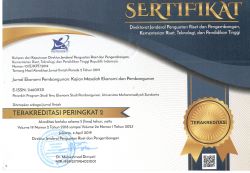Green Perceived Value for Environmentally Friendly Products: Green Awareness Improvement
Didin Syarifuddin(1), Doni Purnama Alamsyah(2*)(1) STP Ars Internasional
(2) Universitas BSI
(*) Corresponding Author
Abstract
This study aims to review the correlation of green perceived value and green brand attribute on green awareness with supporting moderation of customer’s demographic. The review focuses on environmentally friendly products with 467 respondents who come from Supermarket’s customer in West Java Province. Hypothesis test is found that green awareness can be improved through green perceived value and green brand attribute. But green perceived value plays important role in controlling green awareness. Besides that, supporting from customer’s demographic (sex, location, income) also very influenced the correlation level of green perceived value, green brand attribute with green awareness. The study review is useful in reviewing green customer behavior particularly in Indonesia that has still poor of caring; and in the effort of facing global warming through the review on environmentally friendly products
Keywords
Full Text:
PDFReferences
Alamsyah, D. P., & Hariyanto, O. I. B. (2017). Store image of organic product: Social responsibility and trust’s mediator. In Cyber and IT Service Management (CITSM), 2017 5th International Conference (pp. 1–4). IEEE.
Alamsyah, D. P., Trijumansyah, A., & Hariyanto, O. I. B. (2017). Mediating of Store Image on Customer Trust for Organic Vegetables. MIMBAR, Jurnal Sosial Dan Pembangunan, 33(1).
Ariffin, S., Yusof, J. M., Putit, L., & Shah, M. I. A. (2016). Factors Influencing Perceived Quality and Repurchase Intention Towards Green Products. Procedia Economics and Finance, 37(16), 391–396.
Atănăsoaie, G. S. (2013). Eco-Label and its Role in the Development of Organic Products Market. Economy Transdisciplinarity Cognition, 16(1), 122–129.
Bhat, S., & Reddy, S. K. (2001). The impact of parent brand attribute associations and affect on brand extension evaluation. Journal of Business Research, 53, 111–122.
Bobe, M., Procopie, R., Pamfilie, R., & Toma, M. A. (2014). Producer’s responsibility concerning the assurance and statement of quality for foods with “organic image” based on the model of a Romanian company. Amfiteatru Economic, 16(35), 215–227.
Chen, Y., & Chang, C. (2012). Enhance Green Purchase Intentions. The Roles of Green Perceived Value, Green Perceived Risk, and Green Trust. Management Decision, 50(3), 502–520.
Chi, H. K., Yeh, H. R., & Jang, B. F. (2008). The Effects of Service Quality, Customer Perceived Value, Customer Satisfaction on Behavioral Intentions: A Study of Mobile Value-Added Services in Taiwan. The Business Review Cambridge, 10(1), 129–136.
Ellison, B., Duff, B. R. L., Wang, Z., & White, T. B. (2016). Putting the organic label in context: Examining the interactions between the organic label, product type, and retail outlet. Food Quality and Preference, 49, 140–150. http://doi.org/10.1016/j.foodqual.2015.11.013
Haghjou, M., Hayati, B., Pishbahar, E., Mohammadrezaei, R., & Dashti, G. (2013). Factors affecting consumers’ potential willingness to pay for organic food products in Iran: Case study of Tabriz. Journal of Agricultural Science and Technology, 15(2), 191–202.
Keller, K. L. (1993). Conceptualizing, Measuring, and Managing Customer-Based Brand Equity. Journal of Marketing, 57(1), 1. http://doi.org/10.2307/1252054
Khor, K. S., Udin, Z. M., Ramayah, T., & Hazen, B. T. (2016). Reverse logistics in Malaysia: The Contingent role of institutional pressure. International Journal of Production Economics, 175, 96–108. http://doi.org/10.1016/j.ijpe.2016.01.020
Kim, H. Y., & Chung, J.-E. (2011). Consumer Purchase Intention For Organic Personal Care Products. Journal of Consumer Marketing, 28(1), 40–47.
Lassoued, R., & Hobbs, J. E. (2015). Consumer Confidence in Credence Attributes: The Role of Brand Trust. Food Policy, 52, 99–107. http://doi.org/10.1016/j.foodpol.2014.12.003
Lian, S. B., Safari, M., & Mansori, S. (2016). The effects of marketing stimuli factors on consumers’ perceived value and purchase of organic food in Malaysia. Jurnal Pengurusan, 47, 119–130.
Mourad, M., Serag, Y., & Ahmed, E. (2012). Perception of green brand in an emerging innovative market. European Journal of Innovation Management, 15(4), 514–537. http://doi.org/10.1108/14601061211272402
Nadzri, W. N. M., Musa, R., Muda, M., & Hassan, F. (2016). The Antecedents of Brand Experience within the National Automotive Industry. Procedia Economics and Finance, 37(16), 317–323. http://doi.org/10.1016/S2212-5671(16)30131-9
Nikhashemi, S. R., Tarofder, A. K., Gaur, S. S., & Haque, A. (2016). The Effect of Customers’ Perceived Value of Retail Store on Relationship between Store Attribute and Customer Brand Loyalty: Some Insights from Malaysia. Procedia Economics and Finance, 37(16), 432–438. http://doi.org/10.1016/S2212-5671(16)30148-4
Othman, C., & Rahman, M. S. (2014). Investigation of the Relationship of Brand Personality, Subjective Norm and Perceived Control on Consumers’ Purchase Intention of Organic Fast Food. Modern Applied Science, 8(3), 92–106.
Parsa, H. G., Lord, K. R., Putrevu, S., & Kreeger, J. (2015). Corporate social and environmental responsibility in services: Will consumers pay for it? Journal of Retailing and Consumer Services, 22, 250–260. http://doi.org/10.1016/j.jretconser.2014.08.006
Pearson, D., Henryks, J., & Jones, H. (2011). Organic food: What we know (and do not know) about consumers. Renewable Agriculture and Food Systems, 26(2), 171–177. http://doi.org/10.1017/S1742170510000499
Purnama, J., & Nurhadi. (2014). Pengaruh Produk Ramah Lingkungan, Atribut Merek Hijau, Iklan Peduli Lingkungan Dan Persepsi Harga Premium Terhadap Keputusan Pembelian Produk AMDK. Jurnal Fakultas Ekonomi, (5), 1–9.
Rahmi, D. Y., Rozalia, Y., Chan, D. N., Anira, Q., & Lita, R. P. (2017). Green Brand Image Relation Model, Green Awareness, Green Advertisement, and Ecological Knowledge as Competitive Advantage in Improving Green Purchase Intention and Green Purchase Behavior on Creative Industry Products. Journal of Economics, Business & Accountancy Ventura, 20(2). http://doi.org/10.14414/jebav.v20i2.1126
Rizwan, M., Mahmood, U., Siddiqui, H., & Tahir, A. (2014). An Empirical Study about Green Purchase Intentions. Journal of Sociological Research ISSN Journal of Sociological Research, 5(1), 290–305. http://doi.org/10.5296/
Sandalidou, E., Baourakis, G., & Siskos, Y. (2002). Customers’ perspectives on the quality of organic olive oil in Greece: A satisfaction evaluation approach. British Food Journal, 104(3/4/5), 391–406. http://doi.org/10.1108/00070700210425787
Shaharudin, M. R., Pani, J. J., Mansor, S. W., & Elias, S. J. (2010). Factors Affecting Purchase Intention of Organic Food in Malaysia’s Kedah State. Cross-Cultural Communication, 6(2), 105–116.
Suki, N. M. (2013). Green awareness effects on consumers’ purchasing decision: Some insights from Malaysia. International Journal of Asia-Pacific Studies, 9(2), 49–63.
Suki, N. M., Suki, N. M., & Azman, N. S. (2016). Impacts of Corporate Social Responsibility on the Links Between Green Marketing Awareness and Consumer Purchase Intentions. Procedia Economics and Finance, 37(16), 262–268. http://doi.org/10.1016/S2212-5671(16)30123-X
Syarifuddin, D. (2016). Nilai Wisata Budaya Seni Pertunjukan Saung Angklung Udjo Kota Bandung Jawa Barat Indonesia. Jurnal Manajemen Resort Dan Leisure, 13(2), 53–60.
Syarifuddin, D. (2017). Competitive Advantage on Hotel Industry in Pekanbaru Indonesia. Internasional Business Management, 11(2), 397–406.
Wirth, F. F., Stanton, J. L., & Wiley, J. B. (2011). The Relative Importance of Search Versus Credence Product Attributes: Organic and Locally Grown. Agricultural and Resource Economics Review, 40(1), 48–62.
Wu, S., & Chen, Y. (2014). The Impact of Green Marketing and Perceived Innovation on Purchase Intention for Green Products. International Journal of Marketing Studies, 6(5), 81–101. http://doi.org/10.5539/ijms.v6n5p81
Yoo, S. J., & Chang, Y. J. (2005). An Exploratory Research on the Store Image Attributes Affecting Its Store Loyalty. Seoul Journal of Business, 11(1), 19–41.
Article Metrics
Abstract view(s): 2598 time(s)PDF: 1310 time(s)















